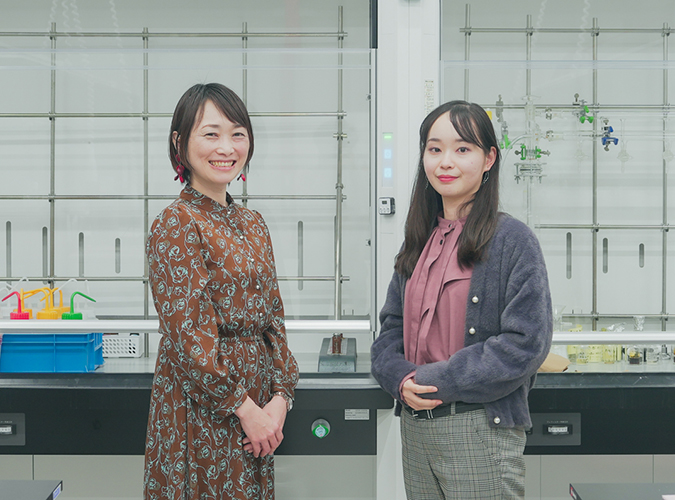150周年記念企画
「未来を拓く青学マインド」
ワクワクを大切に、
国際社会に挑戦する人生を切り拓く
|校友・卒業生|
外務省
島根 玲子
×
青山学院高等部
説田 祥奈/一色 里菜
×
国際政治経済学部 国際政治学科
平嶺 日菜
2024年11月青山学院は創立150周年を迎えます。グローバルな思考や世界に通用する多彩な能力を育んだ多くの卒業生が、世界各地で社会に貢献しています。今回は、高校時代に挫折を経験しながらも、青山学院大学文学部に進学、その後、司法試験と国家Ⅰ種試験に合格し、外務省で働く外交官の島根玲子さんをお迎えし、将来、国際社会での活躍を夢・目標にしている青山学院高等部の説田祥奈さん、一色里菜さん、青山学院大学の平嶺日菜さんの3人が、外交官の仕事をはじめ、国際的な仕事に就くためにやるべきこと、国際社会で求められるマインドについてお聞きしました。
Profile
外務省
島根 玲子
2006年 文学部 英米文学科卒業


高校時代に2回の留年と中退を経験。その後、大検(大学入学資格検定)に合格し、青山学院大学文学部英米文学科に進学。卒業後、早稲田大学法科大学院を経て2010年司法試験合格。2011年外務省入省。 経済局、中南米局、アジア大洋州局などを歴任。その一方で、ライフワークとして若い世代を中心に出張授業や講演会を行い、日本と世界の未来を一緒に考える活動を続けている。著書に『高校チュータイ外交官のイチからわかる! 国際情勢』(扶桑社)。

青山学院高等部 2年
説田 祥奈
幼少期にドイツで暮らし、陸続きのヨーロッパで多くの国を訪れた経験から、日本とは異なる世界があることを知る。人と人をつなぐこと、外国と日本を文化や技術を通してつなげ、両国をより良い国へと発展させられる人になることが夢。外交官という職業に憧れがある。バスケットボール部に所属。

青山学院高等部 3年
一色 里菜
中等部より青山学院で学ぶ。高等部2年生の9月に「全日本高校模擬国連大会」予選に参加し、議題となった難民問題に興味をもったことから、将来は国際問題の解決に貢献できる仕事がしたいと考えている。4月から青山学院大学国際政治経済学部に進学予定。大学在学中の留学を視野に、英語力の向上にも努めている。

国際政治経済学部 国際政治学科 3年
平嶺 日菜
高等部のプログラムでフィリピンの貧困問題について学んだことがきっかけで国際政治に関心をもつ。大学2年次後期から1年間、国連の重要拠点があるスイスのジュネーブ大学への交換留学を経験。国際的に活躍できる人物を目指し、自分が本当にしたいことを見極めている最中。
TALK THEME
1st TALK
「外交官と国際公務員の
違いと共通点は?」
「誰とでも仲良くなりたい気持ちや、
相手の懐に飛び込む勇気はどちらにも不可欠」

今日は国際的な視野をもって将来を真剣に考えている皆さんとお会いできてうれしいです。私は外務省に勤めて今年12年目で、これまで中南米の国々、アジア大洋州地域との外交に携わっています。リラックスして、遠慮なく質問してください。

島根さん

一色さん
私は将来、国際問題の解決に貢献する仕事に就きたいという目標があります。世界を舞台に国際協力や開発に関わる仕事を調べると、外交官のほかに国際公務員もありますが、どのような違いがありますか?
外交官と国際公務員の違い、進路を考えるうえで大切な視点ですね。
まず、外交官は国の代表で、その国のために働きます。私は日本の外交官なので、日本の代表として日本のために働くのがミッションです。一方、国際公務員は、WHO(世界保健機関)やUNDP(国連開発計画)、ユニセフ(国連児童基金)などという名前を耳にしたことがあるかもしれませんが、そのような国連の機関で働く職員のことを指します。どの国にも属さず、いわば世界のために働く、というイメージです。「誰のために働くのか」という活動の軸が違うということですね。
具体的な採用のプロセスにも違いがあります。外交官は日本政府が採用します。外交官にも総合職・外務省専門職・一般職という3つの種類があり、総合職と専門職は原則として大卒以上が受験資格となります。名の通り総合的にいろんな仕事を経験する総合職、特定の国や言語を深掘りする専門職など、職種によって外交官としての未来が変わってきます。私はどうしてもやりたい分野があったわけではないので、いろいろ経験してみたいと考え、総合職にしました。もし、「ずっとこの国に関わっていきたい!」というような特定の国があるなら、その国のスペシャリストになるために、専門職を選ぶのもいいと思います。
その一方で、国際公務員の採用は、国連の各機関が行います。国連で働くためには、基本的には大学院修士号が必要で、即戦力としての職務経験も求められます。注意点は、契約期間が2年というケースが多いため、2年後には新しい仕事を見つけなくてはなりません。だから、安定性という面で厳しさもあると思います。なので、国際公務員を目指すならば、「手に職を持つ」ことをおすすめします。実際、国連で働いている方には、弁護士さんやお医者さんなどの資格を持っている方も多いです。契約期間が過ぎたら元の仕事に戻ればいいので、2年という期限を心配する必要はないですね。私自身、大学時代は国連で働きたいと思っていたので、弁護士資格を取りたいと思い、司法試験まで頑張りました。

島根さん

一色さん
それでは、外交官にも、国際公務員にも共通して求められるのはどのようなことでしょうか?
語学力はもちろんですが、国籍を問わず誰とでも仲良くなりたいという気持ち、物おじせずに相手の懐に飛び込んでいく勇気はどちらにも共通して必要だと思います。国際社会での仕事は、会議室でテーブルを挟んで交渉するだけではありません。ときにはコーヒーを飲みながら心を開いて本音を語り合うことも必要です。どこの国の人であっても、人と話して、仲良くなりたい、と思うことがとても大事だと感じています。

島根さん

説田さん
外交官になっても全員海外に行けるわけではないのでしょうか?海外に行けるのは体格が大きくて、強そうな男性が多いと聞いたことがあって…。
性別も体格も関係なく、全員必ず行けますよ。人生の半分くらいは海外になると思います。以前は女性の外交官は少なかったけれど、今の新卒採用は半分近く女性です。もちろん、海外で働くためには、それなりに体力は必要ですよ。でも、もっと大事なのはその人の考えや発言です。赴任先も、性別は関係ないです。男性だからって大変な国に行かなくちゃならない、なんてこともないですよ。
私は今、育児休業中ですが、復職したら、海外に行くと思います。そのときに、夫や子どもをどうするのかというのは、悩みますね。でもよく考えてみれば、これは女性に限った悩みではなく、男性も同じはずです。今は女性も働いているのが当たり前の時代なので、男性が海外赴任のとき、妻をどうするのか、というのはみんな悩みますよね。そういう意味でも、仕事における男女の違いって、どんどんなくなってきている気もします。女性外交官の世界では、夫が一時的に仕事を辞めて主夫をしているというケースも多くあり、いろいろな乗り越え方があると思います。

島根さん

平嶺さん
これまでに外交官になって良かったと思ったこと、反対につらいと感じたことを教えてください。
正直に言って、つらいな、と感じることの方が多いですよ(笑)。でも、たまに「本当にこの仕事についてよかったな」と思える瞬間があるのです。
たとえば、2016年のクリスマスに、当時の安倍首相のハワイ訪問に同行しました。ハワイで当時のオバマ大統領に面会して、真珠湾攻撃の犠牲者を慰霊しました。式典には真珠湾攻撃の被害にあった元軍人のおじいさんたちが車いすで出席していました。そのおじいさんたちを安倍総理とオバマ大統領が抱き締めるシーンを目にした時には、第二次世界大戦で激しく戦った日米が、70年越しに和解したような気がして、胸が熱くなりました。その時に、「こんな歴史的な場面に立ち会えるのは、外交官しかできないな」と思いました。
もちろん、プライベートが犠牲になることもあります。例えば、中南米局の時のある土曜日、遊びに行こうとしたら、キューバのフィデル・カストロが亡くなったとのニュースが飛び込んできました。担当している国の偉い人が亡くなった場合には、弔電とかを出さないといけないので、プライベートの予定を全てキャンセルして、職場に走ったこともありました。急な事態に対応しなくてはならない場面があることも事実です。そうした緊張感やプレッシャーは日々ありますが、その分、経験として返ってくるものも大きいと感じています。

島根さん

平嶺さん
外交官になってご自身の中で変化した点はありますか?
私は講演をするときに、必ずする質問があります。「日本は小さい国だと思いますか?大きい国だと思いますか?」どう思いますか?この質問をすると、9割くらいの人が「日本は小さい国だ」と答えます。私も外交官になる前はそう思っていました。これだけ暗いニュースが多いですから、仕方ないですよね。
けれど、日本の外に出てみると、見方は変わってきます。アジアでも中東でも、たくさんの国が日本を信頼しています。アメリカも、「まずアジアのことは日本に聞こう」と日本の意見を求めてきます。日本の外に出てみると、日本が世界に与える影響力の大きさを知ります。だから、外交官になってからは、「日本は大きい国だ」と思うようになりました。そして、以前よりもっと自分の国が好きになりました。だから、講演会や執筆を通じて、若い人たちに日本人であることに誇りをもって、日本の未来に希望を持ってもらえるような話をすること、これは自分にしかできない仕事だと思っています。

島根さん
2nd TALK
「学生時代に
やっておくべきことは︖」
「この仕事に就いたらどういう
自分になるのか
シミュレーションし、なりたい自分のイメージを明確に」

私は4月から青山学院大学へ進学予定です。国際社会を舞台として活躍する夢を実現させるために、第二外国語で何語を選択するのが良いか、アドバイスをいただけますか?

一色さん

島根さん
その言語を話す人が多いほうが、選択肢が広がると思います。それから、どのような国と関わっていきたいかを考えてみるといいかもしれません。アフリカに興味があるなら、アフリカで広く使用されているフランス語、ラテンのノリが好きだったらスペイン語、とかね。中国語は世界最大の人口を持ちますが、中国と一部東南アジア地域でしか通じないので、中国と関わる仕事をすることになるでしょう。どんな文化が好きなのか、どんな国の人と話したいのか、自分の率直な興味を大切にしながら、第二外国語を選んだらいいのではないでしょうか。
外務省のシステムについてお話しすると、外交官には専門とする言語がひとつ割り振られます。「あなたはフランス語を勉強してください」、「あなたはアラビア語の専門家になってください」といった感じです。私の場合はスペイン語になりました。
入省してしばらくすると、その言語の国、私の場合はスペインに派遣されて、2年間の留学をします。レベルの高いスペイン語力はもちろん、現地の人々の中に入って生活することによって、スペイン語圏の歴史や文化、政治なども広く学ぶことが目的です。スペイン語はスペインや中南米他20の国・地域で公用語となっていますし、アメリカでも「ラティーノ」と呼ばれるラテンアメリカ出身者が急増していて、英語と同じくらいスペイン語が聞こえてきます。世界では、スペイン語を話す人は5億人に達しています。アメリカでもスペイン語の重要性は今後ますます増していきますし、スペイン語を話せるようになって本当に良かったな、と思っています。発音がいわゆるカタカナ発音で、とっても簡単なこともおすすめですよ。
私はジュネーブに留学した当初、現地の人とのコミュニケーションの取り方に苦戦しました。スペインではいかがでしたか?

平嶺さん

島根さん
スペインはいろんな意味で自由な国です。たとえば、スーパーマーケットのレジで行列ができていても、レジの店員さんは携帯電話で誰かとおしゃべりしています。でも、お客さんも誰もそれをとがめることなく、見ず知らずの客同士もおしゃべりしながら待っていたりするんです。日本では考えられないですよね。最初は戸惑いましたが、2年間滞在しているうちに私自身がどんどんスペイン人に同化していき、何事にも「まいっか」という感じで大らかになりました。むしろ日本に帰ってきた時に、「なんでみんなそんなにカリカリしてるの?」とギャップを感じるくらいでした(笑)。
学生のうちにやったほうがいいことをぜひお聞きしたいです。また、やらなくて後悔していることはありますか?

一色さん

島根さん
私が後悔しているのは、在学中に留学*をしなかったことです。留学すると卒業が遅れることを心配する人がいますが、社会に出たら1年の遅れ*なんて誰も気にしません。語学力の向上はもちろん、旅行とは違って、現地で暮らしながら世界を知ることは一生の財産ですよね。大学の奨学金制度を活用することもできるでしょうし、ぜひ挑戦してほしいと思います。
それから、転職が当たり前の時代になったとは言え、就活は本当に大事だと思います。転職するとしても必ず前職について聞かれますし。なりたい自分のイメージを思い描くときに、この職に就いたらどういう自分になるのか?というところまでシミュレーションしてみると良いと思います。私自身は、人脈を手繰り寄せて、その職に就いている人からとにかく話をたくさん聞くことを重視していました。外務省にはインターン制度もありますし、国際機関でのインターンシップ支援事業もあります。学生時代にはそれができる時間も環境もあると思うので、ぜひ学生時代にも、簡単な職業体験みたいなものをしてみるのもいいと思います。
*青学には、4年間で大学を卒業するための留学サポートとして単位認定制度等があります。
詳細はリンクをご確認ください。
私は今、就職活動中です。OB・OGから自己分析が大事とアドバイスをいただくのですが、実際やるとなると自分が何をしたいのか確信が持てなくなってきます。島根さんはどのように将来のビジョン、方向性を見つけていったのですか?

平嶺さん

島根さん
「自己分析」なんていう難しい言葉にとらわれずに、「自分は何をしているときにワクワクするのか?」を考えたらいいと思います。私は学生時代、海外に行くことがとても好きでした。飛行機の窓から知らない土地の景色が目に入ると、とてもワクワクしました。だから、いろんな国に行くことができる職に就こうと考えました。
就活だからって、自己分析を突き詰める必要はないと思います。なぜなら、その仕事が自分の天職かどうかなんて、実際にやってみないとわからないからです。20歳そこらで「自分はこういう人間で、だからこの仕事が自分の天職なんです!」なんて断言できる人いないですよ。就職してからだっていろんなことが起きます。もし就職してみて合わないと思ったら、そのときは違う道に進めば良いのではないでしょうか。深く考えすぎずに、とりあえずワクワクすることをやってみよう、という考えもとっても素敵だと思いますよ。でも、適当に考えるのではなくて、「この仕事ならワクワクを続けられる!」って真剣に考えてみてくださいね。
3rd TALK
「国際的な舞台で
光り輝く青学生らしさとは︖」
「青学生が持つ他者を
慈しむ心は、
他国の人と良好な
関係を築くうえでも大事なものです」


平嶺さん
島根さんが何かアクションを起こそうと思う時に、大切にしていることは何ですか?
「絶対に諦めない、途中で投げ出さない」ということですかね。私は高校生の時、途中で高校生活を投げ出しました。その過去があるから今があるというのは十分にわかっているのですが、高校を辞めたことは正直後悔しています。だから、同じようなことは繰り返したくないな、と思っています。
外交官になると一から勉強しなければいけないことがたくさんあって、辛いと思うときもあります。例えば、私はスペイン語圏の専門家だと思っていたのに、ある日、韓国との慰安婦問題を担当する部署になりました。日本と韓国の間にある歴史認識の違いがどこから生まれるのか、なんでこんな禍根が残っているのかを理解するのはとても根気のいるものでした。でも自分が理解していないことを相手に説明することはできないので、一生懸命勉強しました。
スペイン語もゼロからの勉強だったので、けっこう大変でした。スペインで住んでいたアパートでは、お風呂の壁までスペイン語の付箋だらけで、ルームメイトにびっくりされたこともあります。
司法試験の勉強の時も、外交官になってからも、何度も投げ出したくなることはあったのですが、もう高校生の時みたいに投げ出さないぞ、と思って頑張っています。

島根さん

説田さん
私はバスケットボール部に所属しています。勉強も部活の練習も、50の力でやるより100の力で最後までやり切るほうが自分の身になることはわかっているのに、ダッシュの時とか途中で手を抜きたくなってしまいます。そこをどうやって乗り越えているのですか?
「全力で努力してよかった!」という達成感と成功体験を重ねていくと、また次も頑張ろうと思えるのではないかな。
私自身の経験をお話しすると、青学を卒業する時、文学部から法科大学院に行って弁護士資格を取るなんて、ほぼ無謀な挑戦だと思っていました。法律の勉強なんて初めてだったし、司法試験の勉強はあまりに大変で、何度も諦めそうになりました。次の日の授業の課題が全然わからなくて、徹夜した日も何日もあります。徹夜とか詰め込み勉強って良くないとよく言われるけど、でも諦めそうになったとき、「あの日あんなに頑張れたんだから、あと少しできるかも」と思えるようになりました。だから、法科大学院でも、「今月末まで一生懸命勉強する」と思ってやったら、「なんとか今月も頑張れた」、「今学期末の試験までとりあえず頑張ろう」と思ってやったら「また何とか今学期頑張れた」という小さな目標の繰り返しで、なんとか最後まで完走できた、という感じです。マラソンみたいなもので、「あと1メートル頑張ろう」「あと1キロ走りきろう」と目の前のことを一生懸命頑張っていれば、きっとゴールにたどり着けますよ。
ちなみに、司法試験は合格して本当に良かったと思っています。私は、資格は「自由に生きるための翼」だと思っています。私は、外務省でも、あまり出世や評価を気にせずに自由に仕事をしています。それができるのは、もし、この組織で居場所を失ったとしても、そのときは弁護士として食べていけばいい、そう思えるからです。語学でも、資格でも、何かひとつ確かなものを持つことは、自分の人生を自由にすると思っています。だから、あの時、投げ出さずに頑張って、本当に良かったと思っています。

島根さん

一色さん
青学の良さはどんなところだと思いますか?先輩の平嶺さんと後輩の説田さんにもお聞きしてみたいです。私は中等部から青学に通っていて、生徒の自主性を重んじてくれるところだと感じています。

平嶺さん
私は何より海外に興味があったので、国際的なプログラムや留学などの支援が充実していることが魅力だと感じます。振り返れば、高等部のフィリピン訪問プログラムの代表に選ばれ、フィリピンについて学んだ体験が国際政治への関心につながり、大学に入学してからは何度も国際センターに足を運んで留学のアドバイスをいただきました。奨学金についての相談を経てJASSO(日本学生支援機構)奨学金もいただくことができ、金銭面でのサポートも大きかったです。

説田さん
私は高等部から青学に通っていて感じることですが、自主性のある人、いろいろな制度やプログラムを自分で見つけて行動を起こせる生徒は、学校がその期待に応えて手厚くフォローしてくれる環境が整っているのが青学の良さだと思っています。だからこそ、待っていないで自分から手を挙げようと思えるようになりました。
また、小さい頃から自分とは異なる多様な経験をしている生徒がたくさんいるので、友達の考え方や視野の広さが、私にも新たな気付きとなって還元されているように感じます。
皆さん自由な中でしっかり自立し行動できていますよね。
青学は、世界を切り拓くうえで強みとなるマインドを培ってくれる場所だと思います。平嶺さんが言うように圧倒的に国際色豊かな学習環境で学んでいる青学生なら、勇気をもって国際的な場に立ち、臆さず外国人に話しかけに行くことがきっとできる。
また、多くの国や地域で信仰されるキリスト教に青学で触れた影響も、外交の仕事に生かされていると感じます。他者を慈しむ心は、他国の人と良好な関係を築くために大事なものです。外交では国と国の利害がぶつかって揉めることもありますが、相手を理解し、認め、どこかで許し、それを踏まえて先に進んでいくことが必要で、青学で身に付けたマインドが今に生きていると思います。だから皆さんも自信をもって、型にはまらずまっすぐに、心が動くことに挑戦しながら夢を実現してください。

島根さん

一色さん

説田さん

平嶺さん
ありがとうございました。


After Interview
国際社会での活躍を目指す三人が、島根さんのお話から見つけた夢に近づくヒントとは?

大きな可能性を信じて、諦めずに自分を高めたい
私はこれまで、何か物事をやりたくないとか嫌だと思う時、自分の器が小さいと感じてしまうところがありましたが、島根さんも司法試験や外交官の勉強を何度もやめようと思ったことがあるというお話を伺い、一気に気持ちが軽くなりました。島根さんの「何度もやめたいと思ったけど、諦めなかった」という言葉を胸に大きな可能性を信じて、がむしゃらにやり抜きたいと思います。また、これがあるから大丈夫だと思える自分の武器を身に付ける努力をしてみようと強く感じました。自分の幸せにつながる道を周りの人と切り拓いていくためにも、考えすぎず、大人ぶろうとしすぎず、自分を高めていこうと思います。(説田)

他国の文化を知ることが新たな視点で世界を見る助けになる
島根さんが、ときにはプライベートより外交業務を優先させなくてはならない外交官というお仕事に、何年も従事されていることに感銘を受けました。何か手に職をつけることで自分の身を自由にすることができるというお話はその通りだと感じたので、しっかり心にとめておこうと思います。そして、将来どんな仕事に就くことになろうとも、国際社会の平和に貢献するためには多くの国の文化を知ることが大事だと感じました。その足掛かりとして第二外国語の勉強に取り組みたいです。新たな言語を学ぶことは、自分とは異なる他人の立場になって考えること、全く違う視点から世界を見る助けになると思いました。(一色)

異なるものを受け入れ、共存していく姿勢を大切に
外交官になって外側から日本を見つめ直すと、思っていた以上に大きく感じたというお話を受けて、一歩外側から物事を考えることに加え、物事の新しい側面を発見したときにそれを受容できる柔軟な姿勢と思考を持っておきたいと考えるようになりました。また、自分の気持ちを考えたうえでその先の姿まで見据えて行動してきたからこそ、現在の島根さんがあるのだということに非常に感銘を受けました。自分の今の気持ちを見つめること、その先にいる自分を考えることを大切にしていきたいと思いました。グローバルに活躍し、人のためになるような仕事をするという理想の将来像に近づくためには、まずは自分自身が心を開いて異なるものを受け入れ、共存していく姿勢を持つことが大切だと思ったので、多くの人と会話を重ね、さまざまな経験を積んでいきたいです。(平嶺)






















